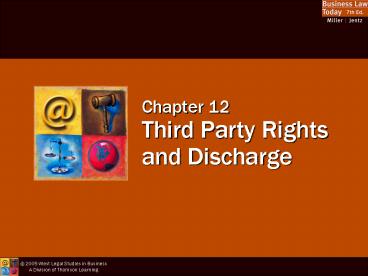Chapter 12 Third Party Rights and Discharge - PowerPoint PPT Presentation
1 / 10
Title:
Chapter 12 Third Party Rights and Discharge
Description:
What is the difference between an assignment and a delegation? ... Discharge by Novation: new contract with substitution of a third party for one ... – PowerPoint PPT presentation
Number of Views:286
Avg rating:3.0/5.0
Title: Chapter 12 Third Party Rights and Discharge
1
Chapter 12Third Party Rights and Discharge
2
Learning Objectives
- What is the difference between an assignment and
a delegation? - What rights can be assigned despite a contract
clause expressly prohibiting assignment? - What factors indicate a third party is an
intended beneficiary? - How are most contracts discharged?
- What is a contractual obligation, and how might a
condition affect contractual performance?
3
Assignments
- Transfer of contractual rights to a 3rd party
(assignee). - The assignee has the right to demand performance
from the other original party (Obligor) to the
contract. - Cannot Assign rights for personal services or
when obligors performance changes. - Forest Commodity Corp. v. Lone Star Industries,
Inc. (2002).
4
Delegations
- Transfer of duties to a 3rd party (Delegatee) by
Delegator. - Delegatee owes duty to original party in
contract. - Delegator is still liable for performance of duty.
5
Third Party Beneficiaries
- 3P Intended Beneficiary (Creditor and Donee)
Original parties to K intend at the time of
contracting that the contract performance
directly benefit a 3rd party. After rights vest,
3P can sue for breach. - 3P Incidental Beneficiary. Benefit is
unintentional. 3P has no rights. - Vogan v. Hayes Appraisal Associates, Inc. (1999).
6
Contract Discharge
- Discharge is the full performance of all duties.
- Conditions to Performance
- Condition is a possible future event that may or
may not happen. - Triggers or terminates performance.
- Condition Precedent prior to performance
- Condition Subsequent follows initial
performance. - Concurrent occur simultaneously.
7
Contract Discharge
- Discharge by Performance Complete vs.
Substantial Performance - Complete Performance perfect performance under
the contract. - Substantial Performance technically a minor
breach but as long as in good faith, the
non-breaching party remains liable to pay. - Satisfaction Contract performance is conditioned
on reasonable satisfaction.
8
Contract Discharge
- Material Breach
- When performance is not substantial.
- Innocent party is excused from performance and
has the right to sue for damages. - A minor breach may be cured.
- Kim v. Park (2004).
- Anticipatory Repudiation
- One party gives notice of refusal to perform.
- Innocent party treats AR as material breach.
9
Contract Discharge
- Discharge by Agreement
- Discharge By Mutual Rescission parties must make
another agreement. - Discharge by Novation new contract with
substitution of a third party for one of the
original parties. - Accord and Satisfaction settlement to discharge
original contract.
10
Contract Discharge
- Discharge by Operation of Law
- Contract Alteration.
- Statutes of Limitations.
- Bankruptcy.
- Impossibility of Performance (Objective).
- Partys incapacitation.
- Subject matter is destroyed.
- Performance becomes illegal.
- Commercially impracticable.































